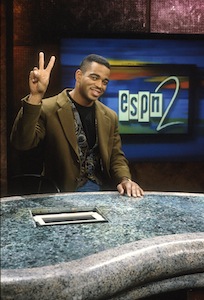Stuart Scott will surely be missed; but by reflecting on all of the examples he led by, and lessons he left us with, his legacy will live forever.
Yesterday morning, around 10:45 am, I woke up to my shouting mom, pleading for my brother and I to avoid being late for church – again. Conditioned to value digital updates over being on time, I took a few moments to check my Twitter and Instagram feeds before hopping into the shower.
It was LeBron James and Dwayne Wade that broke the news to me with almost simultaneous posts. Stuart Scott, an ESPN legend had passed at the hands of cancer. I was, immediately, was overcome with a brief, consuming numbness; a feeling I’ve only experienced a hand full of times in life.
Although I never personally knew Stuart, his impact and influence in my upbringing almost suggests otherwise. I grew up watching him religiously, on many early mornings and late nights, throughout the course of his 21+ year stint at ESPN. It was because of him, and a select few other sport journalists, that I nearly graduated with a journalism degree, authored over 200 published literary works to date, and am even penning this post.
There was always something intriguing to me, about helping others disseminate the concrete: painting descriptive imagery, via the use of words and emotions. Journalistic writing in particular, was always intriguing because it aided people like me in destroying creative boundaries that we’re constantly subjected to. Stuart Scott helped elevate my intrigue by bringing a certain cool factor to the art form and delivering it in relatable packaging.
Our last recollection of Stuart comes from his legendary, Jimmy V-esque ESPY’s speech – perhaps his finest moment as a sportscaster – that sent chills down the spines of the millions of Americans who tuned it. In addition to bringing forth cancer awareness, and exposing the anguish it causes to the masses, he also inspired patients alike to fight their battle unequivocally, encouraging them to live life to the best of their ability.
In remembering Stuart Scott, two life lessons that are universally applicable come to mind:
1. Professionally: Be Yourself, Unapologetically
Perhaps the main reason why Stuart’s legacy will stand the test of time, was his willingness to stay true, amid deterrence. Stuart was unapologetically, himself.
Often, professionally, we struggle to muscle up the courage to stay true (creatively, habitually etc.), with the goal of assimilating to an already established, professional environment.
Stuart’s legacy reminds us that while conformity is okay, individuality and healthy risk-taking (so long as you’re good at what you do) can breed transcendence.
At a time where commentary was very bland, Stuart bent rules incorporating hip-hop lyrics, and pop culture phrases into telecasts. His originality helped ESPN usher in a new viewership demographic, while boosting the popularity of ESPN2.
Decades later today, after industry-wide doubt and criticisms, thousands of anchormen (and women) leverage Stuart’s witty style, treading the line of political correctness and chic, in their delivery – with hopes of relating to younger audiences.
2. In Life: “Fight Like Hell”
I find it so incredible that Stuart’s first stint with cancer commenced late 2007, but his viewers around the world didn’t take notice until formal announcements were made years later.
His ability to perform with the best of them, amid three battles with such a formidable opponent in cancer, speaks volumes to the determination and will he possessed. In a 2013 self-published piece with Men’s Health, Stuart articulated his killer mindset after the initial diagnosis:
I went straight into battle mode. Every morning I’d wake up and have an internal conversation with cancer. “All right, dude,” I’d tell it, “go ahead and hit me. But I’m going to hit you back even harder.“
That mentality is something we could all adopt, whether battling a scary health condition or matters more typical: like dealing with setbacks and trying situations, professionally, in business, school, or with family etc. Stuart’s fight brings – to the national stage – necessary context to the issues that we allow to stifle our focus, determination and efficiency, every day.
Stuart taught me that the issues that plague us should never overshadow our push for living, on the daily, with a purpose.
Subconsciously find yourself doing so? Take time to think of the millions of courageous souls, fighting for their lives day in + day out, that still manage to stay positive (with uncompromising productivity). That should help get you back on track!
Stuart Scott will surely be missed; but by reflecting on all of the examples he led by, and lessons he left us with, his legacy will live forever.




